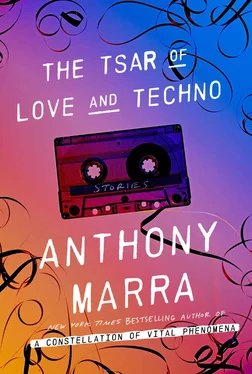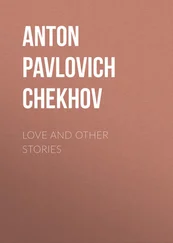I grew up in the southern highlands, just a few kilometers away from the pasture. Illiterate villagers who knew nothing of art proudly claimed this strip of soil worthy of Zakharov’s paintbrush. Though the land was technically part of a state farm, nothing was ever planted, and flocks were banned from grazing because no one liked the idea of sheep relieving themselves on Zakharov’s pasture. In secondary school, my class took a trip to the Grozny Museum of Regional Art and I finally saw the canvas that existed more vibrantly in village lore that it ever could on a museum wall.
More than anything, it was that painting that led me to study art at university. There I met and married Liana. We lived with my parents in cramped quarters well into our twenties, and found the privacy to speak openly only in deserted public areas: on the roof of the village schoolhouse, in the waiting room of the shuttered village clinic, in Zakharov’s pasture. After I received my doctorate and a position at the museum, we relocated to a Grozny flat, where we learned to talk in bed.
The USSR fell. We had a son. With the assistance of the Interior minister, I purchased the dacha on Zakharov’s pasture amid the frenzied privatization of the post-Soviet, prewar years. When the first war began, I stayed in Grozny and did my best to protect the museum from the alternating advances of foreign soldiers and local insurgents. My wife and son lived in the dacha, far from the war.
In my tourist bureau research, I’ve learned that the first and second Chechen wars have made the republic among the most densely mined regions in human history. The United Nations estimates five hundred thousand mines were planted, roughly one for every two Chechen. I didn’t know that number when I visited the dacha during the first war, taking what provisions I could cull from the ruined capital, a few treats for which I paid dearly, tea leaves for my wife, sheets of fresh drawing paper for my son. But I knew enough to warn them never to venture into the pasture. Until May 1996, they heeded my warnings. I don’t know how it happened, why they walked into the pasture, if they were pursued, if they fled masked men, if the mined field was a sanctuary compared with the depredations of their pursuers, if they were afraid, if they called for help, if they called for me. Those questions have been unanswerable from the moment they swung open the back door, descended the stairs, and ran across that fallow garden. I’d like to believe it was a day so beautiful they couldn’t be kept from the crest of the hill, the open sky, that radiance. I’d like to believe that my wife suggested a picnic on the hill. I’d like to believe that the moment before their last moment was one of whimsy, charm, anything to counter the more probable realities at the edge of my imagination. With terror or joy, with abasement or delight, they remained my wife and child, right to the end — I must remind myself because in the mystery that subsumes those final moments, they are strangers to me. I was in Grozny, at the museum, and never heard the explosion.
FOR the two weeks Nadya is in Petersburg, my evenings stagnate. Russian dignitaries, potential investors, state-approved journalists, and the omnipresent oilmen fill my mornings and afternoons, but when I return to my flat I’m reminded I am, at the end of the day, alone. Twice I go to Nadya’s flat to clean her bedroom closet, the back corners of shelves, behind the toilet, the little places that even in her fastidiousness she’d miss. I’m uncomfortable with the neediness that underlies my decision to insert myself into her life under the pretext of concern. I am concerned, of course. Some nights I wake from nightmares that she has tripped over a chair, a shoe, a broomstick I could have moved. But in rare moments — like now, as I scour the mildew from her bathroom tiles — clarity surfaces through the murky soup of daily life, and I know I have purposefully made myself into a crutch she cannot risk discarding. What I don’t know is whether I’ve done so out of love or loneliness, or if in this upside-down world where roofs lie on streets, intentions have lost their moral weight altogether.
One Wednesday, feeling unusually alert given the hour, I contemplate Zakharov’s pasture. It’s the least ruined of the canvases, stained with ash and soot, but still the damage is minor. Most severe is the burn hole at the center of the canvas, upon the hill, and even though the hole was burned into the canvas during the museum fires, I see it as the crater left by the land-mine blast, the hole through which everything disappeared. A few years ago, Nadya could’ve restored it in days.
An idea. I let myself back into Nadya’s flat to retrieve her restoration kit. It’s at her desk, amid the black-and-white photographs censored by the propaganda officer who had painted the Grozny party boss into the foreground of the Zakharov. Nadya became fascinated with the propaganda officer after she had expunged the party boss from the painting, particularly when she discovered that he had inserted a portrait of the same person into hundreds of the censored images, from boyhood to elderly years. If you lined up all the photographs, you might see this stranger’s entire life unfold before you in the background. I pause on one, identified as Leningrad 1937 in pencil on the back. Here he’s just a boy, chubby face and gray eyes below the accent mark of a cowlick, hardly noticeable in the crowd. I feel him staring up at me with an intensity approaching sentience, and for a moment I can’t move: His gaze has pierced and pinned me to a present space we share. How did he die? The question has looped through me on a ticker tape these past five years, but I have never before asked it about a boy who was not my son.
Back home I set the contents beside the Zakharov canvas. Plastic bottles of emulsion cleaner, neutralizer, gloss varnish, conditioner, and varnish remover. A tin of putty. Eight meters of canvas lining. A depleted packet of cotton-tipped swabs. A dozen disposable chloroprene gloves. I’d taken a yearlong course in conservation at university, but my real education came from Nadya, when, in the months after my family died, I neglected my duties as deputy director and spent most afternoons in her office, watching her work.
Every evening for the next week I snap on the chloroprene gloves and wash away the surface dirt with cotton balls dampened in neutralizer. The emulsion cleaner smells of fermented watermelon, and I apply it with the swabs, running small circles until the cotton tips gray and the unadulterated color of Zakharov’s palette is revealed. Using the repair putty as sealant, I patch the burn hole with a square of fresh canvas. Then, for the real challenge, I paint.
The patched hole is the size of a halved playing card in the center-right of the painting, near the cresting hill. The grass, turned emerald by sunlight, must be flawless, the gradation beyond reproach, and I spend several hours testing different blends of oils before coloring the canvas patch with delicate brushstrokes. As I work, I realize that even in his rendering of a distant field of grass, Zakharov is beyond imitation. I lean back, search the painting for two familiar figures, as I have for years, but this time is different. Nadya would never forgive me had she been here and been able to see me paint, upon the patched hole on the hillside, a woman and a boy.
With quick, strong lines, I draw them as silhouettes. The boy’s arms are raised, his body elongated as he makes for the crest, his hands thrown open. The woman, a step behind, follows him up the hill. Their backs are to me. The sun rakes the grass and ripe apricots bend the branches. No one chases them. They run from nothing.
NADYA has returned and the white tea has cooled in our cups and still she hasn’t mentioned the Petersburg eye surgeons.
Читать дальше












